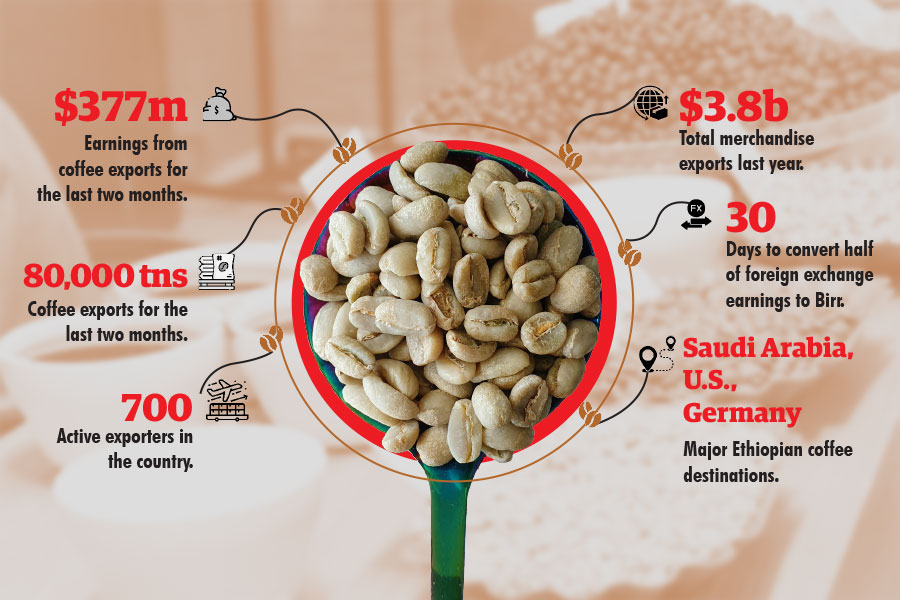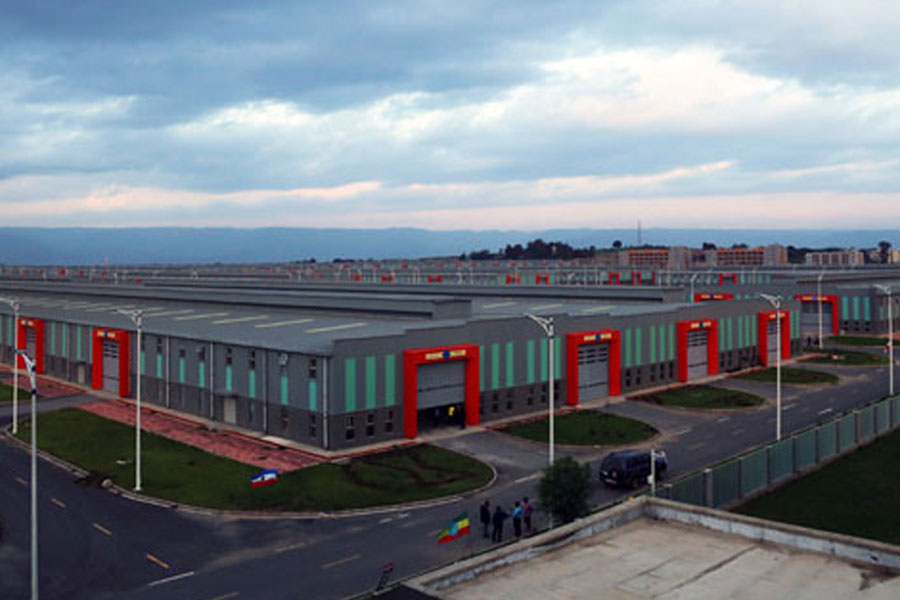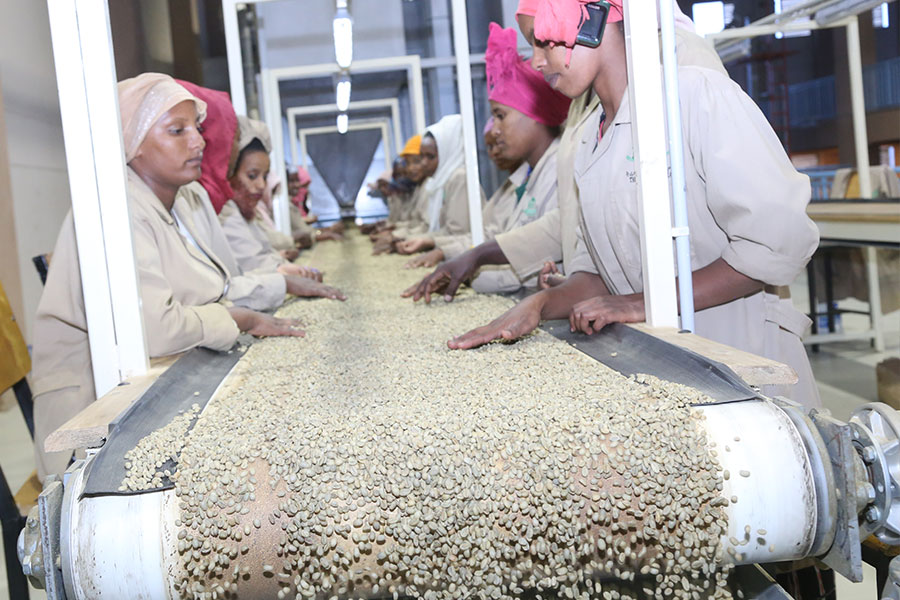
Fortune News | Sep 30,2023
Feb 12 , 2022
By TSION HAILEMICHAEL ( FORTUNE STAFF WRITER )
Exporters of primary commodities face difficulties shipping to China following stricter requirements on imported food items. The Chinese General Administration of Customs issued a compelling regulation at the beginning of the year for exporters to operate warehouses that can accommodate annual shipments and machinery to clean the exported items. Warehouses need to be made of concrete and cover more than 500sqm to be eligible.
The Ministry of Agriculture (MoA) has been designated to register coffee, oilseeds, and cereals exporters to ensure compliance with the regulation. It is expected to send applications and supporting documents to the Chinese General Administration of Customs for approval. Exporters with approval will ship their goods to ports in China for five years.
This is the first time the Chinese government has imposed requirements on exports from Ethiopia, according to Girma Bekele, director of plant health and product quality control at the Ministry.
“The requirement is intended to guarantee food safety and quality control," he told Fortune.
“We've already dispatched officers outside of Addis Abeba to evaluate warehouses and processing machines."
Officials of the Ministry are busy monitoring exporters through document reviews and on-site inspections. Around 183 exporters have already been approved by the Chinese government, and another 200 are in the process.
Yhaenu Plc has been exporting oilseeds, pulses, niger seeds and green mung beans to China for the last 17 years. Incorporated in 2003 with one million Birr capital, it is one of the companies interested to register with the Ministry for eligibility. Its General Manager, Yared Fayessa, accepts the new terms as having advantages to exporters like Yhaenu, which has met the requirements, operating three warehouses with a storage capacity of 150,000qtl and six cleaning machines.
“The requirement may encourage the exports of quality products," said Yared. "However, it'll push many exporters from the business."
Exporters unable to own such facilities rent warehouses and cleaning machines.
The requirements might also further discourage a weakened oilseed industry, which has witnessed export volumes decline by eight percent annually over the past decade. Still, oilseeds are among the top foreign currency earners, accounting for nearly 12pc of the 3.6 billion dollars in export revenues last year. Industry players attribute prices volatility in the global market, currency fluctuations and production decline to the deteriorating export trade performance in recent years.
“Many have already ceased to export sesame,” said Yared.
China was the biggest buyer of sesame from Ethiopia seven years ago, accounting for 70pc of total sales. However, this is changing as it diversifies its imports and turns to other sources in Africa. It is the fourth largest buyer from Ethiopia this year.
One company that has stopped exporting sesame to China is Dawunt Trading Plc. It had been shipping the oilseed to China for five years before making stopping five months ago. Its management contends restrictions on forex retention have made the business unviable. Dawunt uses the foreign currency it generates from the agricultural exports to import a wide range of products such as construction machinery and equipment.
“I don't see any reason to engage in the export business other than easy access to foreign currency," said Fassil Melese, major shareholder and general manager of the company.
Dawunt has instead been exporting sesame to Israel, the top destination for the commodity over the past couple of years. It owns cleaning machines and the warehouse space, but it will not register under the Agricultural Ministry, disclosed Fassil.
"The business is no longer profitable," he told Fortune.
Although sesame exports to China are declining, the volume of coffee and soybeans shipped to the world's second-largest economy is rising. Four years ago, China was ranked 20th top coffee export destinations. It had moved to seventh place last year. Industry players warn the new requirements will harm the volume of coffee exported to China.
Abebe Mulegeta Trading Plc, registering, began to export coffee to China.
“This is an advantage for exporters like us who already have warehouses and processing machines,” said Ahmed Elias, finance manager. “But it will knock out many exporters.”
Gizat Worku, general manager of the Ethiopian Coffee Exporters Association, is optimistic about the requirements. His organisation has been discussing the issue with officials from the Agriculture and Foreign Affairs ministries.
“When quality issues arise, the system will allow us to trace the root of the problem and make the necessary adjustments,” he said.
The export of soybeans to China has been growing in recent years, following China's trade dispute with the United States, the second-largest producer of soybeans globally. Ethiopia exported a record level of 230,000qtl of soybean to China in 2017/18.
PUBLISHED ON
Feb 12,2022 [ VOL
22 , NO
1137]

Fortune News | Sep 30,2023

Radar | Apr 06,2019

Fortune News | Oct 13,2024

Radar | Oct 23,2023

Fortune News | May 08,2021

View From Arada | Jun 15,2024

Radar | Oct 18,2025

Fortune News | Sep 18,2022

Fortune News | Jan 22,2022

Fortune News | Nov 05,2022

Dec 22 , 2024 . By TIZITA SHEWAFERAW
Charged with transforming colossal state-owned enterprises into modern and competitiv...

Aug 18 , 2024 . By AKSAH ITALO
Although predictable Yonas Zerihun's job in the ride-hailing service is not immune to...

Jul 28 , 2024 . By TIZITA SHEWAFERAW
Unhabitual, perhaps too many, Samuel Gebreyohannes, 38, used to occasionally enjoy a couple of beers at breakfast. However, he recently swit...

Jul 13 , 2024 . By AKSAH ITALO
Investors who rely on tractors, trucks, and field vehicles for commuting, transporting commodities, and f...

Oct 25 , 2025
The regulatory machinery is on overdrive. In only two years, no fewer than 35 new pro...

Oct 18 , 2025
The political establishment, notably the ruling party and its top brass, has become p...

Oct 11 , 2025
Ladislas Farago, a roving Associated Press (AP) correspondent, arrived in Ethiopia in...

Oct 4 , 2025
Eyob Tekalegn (PhD) had been in the Governor's chair for only weeks when, on Septembe...